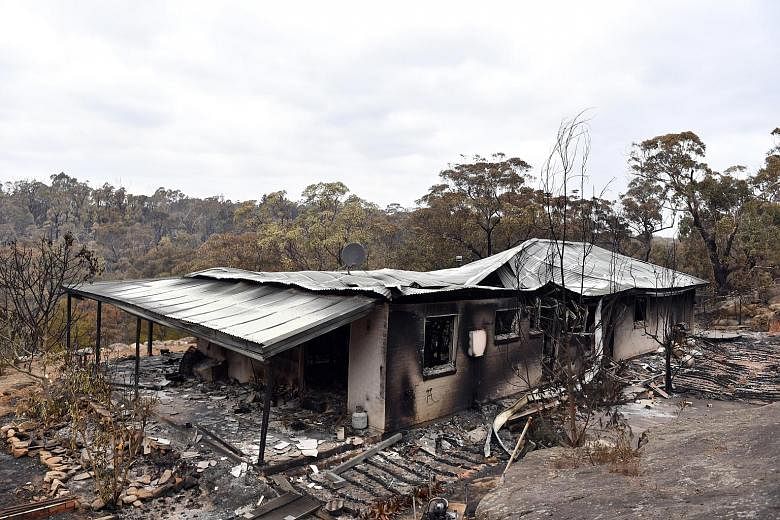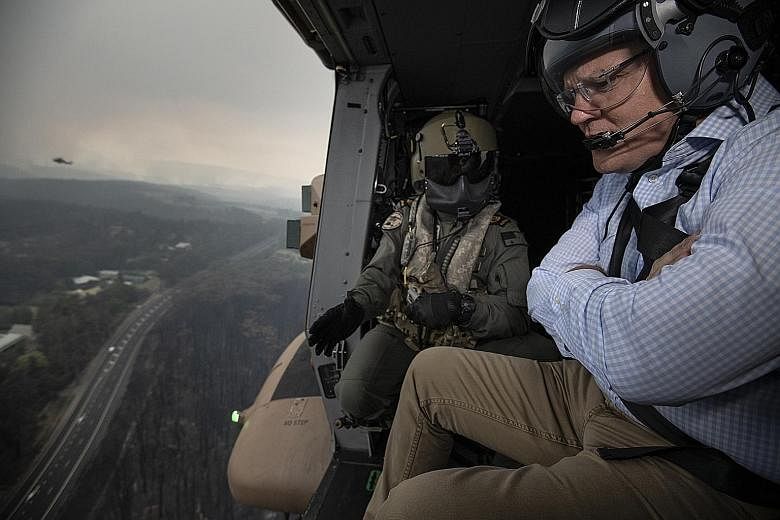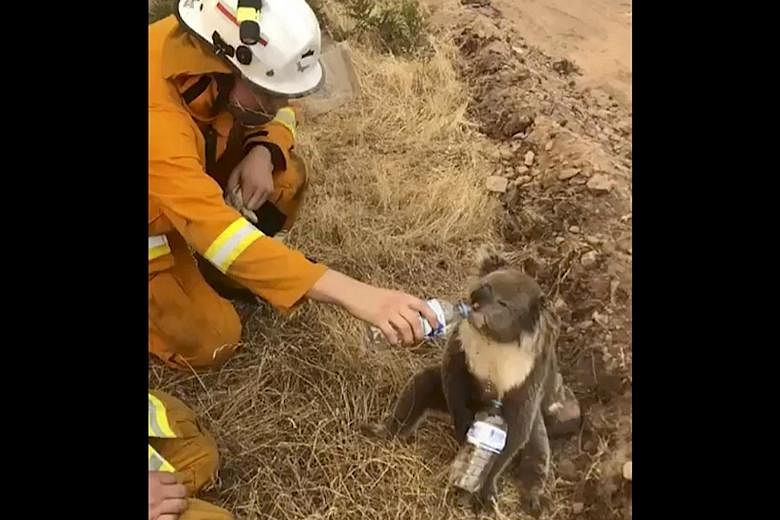SYDNEY • Australian Prime Minister Scott Morrison yesterday rejected calls for "reckless" and "job-destroying" cuts to the nation's vast coal industry in the face of a deadly climate-fuelled bush fire crisis.
Mr Morrison has come under severe criticism for what many voters and climate scientists say is his conservative government's weak policies to fight climate change, especially his support for highly polluting coal.
He has fiercely defended the lucrative coal industry in Australia, the world's largest exporter of coal and liquefied natural gas (LNG). The country produces a third of global coal exports and the industry provides work in key swing electoral districts.
"I am not going to write off the jobs of thousands of Australians by walking away from traditional industries," Mr Morrison told the Seven Network, in one of several morning interviews rejecting calls for further action.
"What we won't do is engage in reckless and job-destroying and economy-crunching targets which are being sought," he told Channel Nine, responding to calls for more climate-friendly policies.
Mr Morrison's media blitz came as he sought to limit the political fallout from a much-criticised Hawaiian holiday - taken as bush fires destroyed an area the size of Belgium and unleashed toxic smoke across major Australian cities.
Holiday plans of many Australians have been hit, with national parks closing camp sites and the main coastal road linking Sydney with southern beach towns again shuttered because of fires.
The crisis keeps growing as the fires consume more forests and farmlands, belching out huge smoke plumes that can be seen from space.
Blazes in South Australia and New South Wales destroyed around 180 houses and killed one person over the weekend.
More than 3.7 million ha across five states have burned since the crisis started during winter, months before the usual summer fire season.
Around 200 blazes were burning across the world's driest inhabited continent yesterday. New South Wales, the most populous state, remains at the forefront of the disaster with almost 800 houses lost since the fire season began.
-
180 Estimated number of houses destroyed in blazes in South Australia and New South Wales over the weekend.
>3.7m Number of hectares across five states that have burned since the crisis started during winter, months before the usual summer fire season.
Conditions eased markedly yesterday, giving the authorities a respite to prepare for worsening conditions post-Christmas, when temperatures are expected to soar again by the weekend.
The authorities said little was left of the small town of Balmoral, south-west of Sydney, where 67-year-old artist Steve Harrison told public broadcaster ABC he had been forced to seek shelter from a raging wildfire in a make-shift kiln.
"I ran to my ute (pick-up) but my garden was already on fire, the driveway was on fire, the road was on fire so I couldn't evacuate," he said. "The day before I had actually built myself a small kiln down the back - a coffin-sized kiln - just big enough for me to crawl inside.
"I was in there for half an hour while the firestorm went over. It was huge, just glowing orange-red everywhere. Just scary. I was terrified."
Bush fires occur frequently in Australia, but scientists say several weather phenomena have come together to make this spring-summer bush fire season among the worst on record.
Record-low rainfall, record-high temperatures and strong winds have made the situation more combustible. Climate change has exacerbated the extreme conditions, climate scientists say.
Mr Morrison has insisted Australia will meet its 2030 emissions targets under the United Nations' Paris Climate Agreement.
"I'm going to maintain the course of responsible management, responsibly addressing climate change and responsibly ensuring that we can grow our economy in what is a very tough climate at the moment," he told the Seven Network.
Under the 2015 Paris climate pact, Australia committed to reduce its emissions by 26 to 28 per cent below 2005 levels by 2030.
However, environmental activists say those targets are not nearly enough to help the world keep global warming to safe levels, and that far deeper cuts are needed.
Mr Morrison's government has further been criticised for seeking to achieve its 2030 target by counting carbon emissions credits under a complicated global accounting method, rather than through new reductions.
While Mr Morrison says Australia is responsible for just 1.3 per cent of global carbon emissions, its fossil fuel exports account for an estimated 7 per cent of the world's carbon emissions when the exported coal and LNG is burned.
Opposition leader Anthony Albanese, from the Labor party, pilloried Mr Morrison's "stubbornness" in refusing "to change course".
"Clearly, this is not business-as-usual. But Mr Morrison is not listening," Mr Albanese said. "People are scared of what is going on around them."
AGENCE FRANCE-PRESSE, REUTERS, BLOOMBERG



